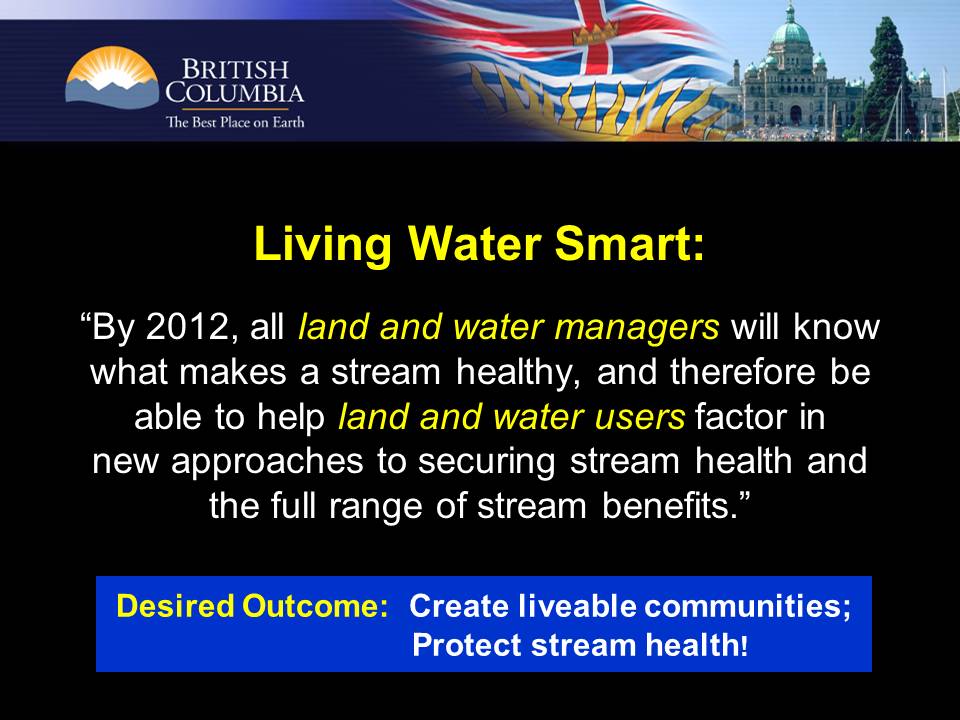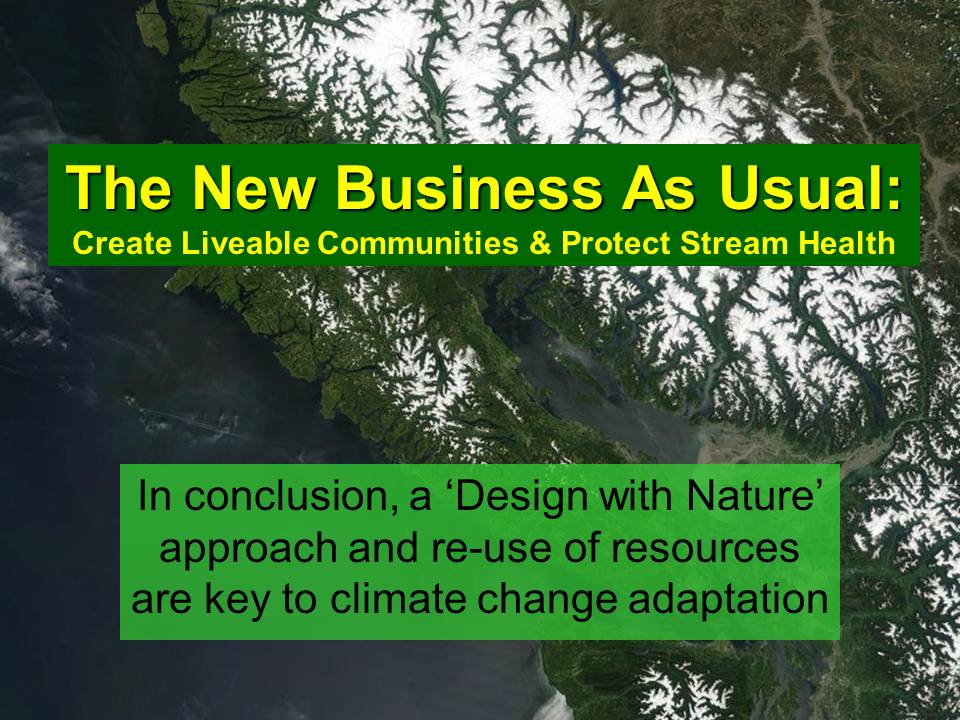RE-CAP FOR 2008 COMOX VALLEY LEARNING LUNCH SEMINAR SERIES: “There is a fundamental difference between outcome–oriented and output-oriented approaches to planning and engineering of municipal infrastructure. We are trying to change the way our communities look and feel,” stated Kim Stephens in his summation of the learning outcomes for all three seminars comprising the series


By 2012, all land and water managers and users will be doing business differently to create liveable communities & protect stream health
Precedent-setting in its scope and approach to building local government capacity, the Vancouver Island Learning Lunch Seminar Series is designed to help local governments determine how they will achieve this over-arching goal statement in Living Water Smart, BC’s water plan:
- By 2012, all land and water managers will know what makes a stream healthy, and therefore be able to help land and water users factor in new approaches to securing stream health and the full range of stream benefits (page 43, Living Water Smart)
Organized under the umbrella of the Water Sustainability Action Plan for Britsh Columbia, the series is adding depth to Living Water Smart. The 2008 provincial pilot was implemented through CAVI…which is the acronym for Convening for Action on Vancouver Island.
Vancouver Island Demonstration Program: Curriculum
“The goal of the series is to inform and educate local government practitioners. We describe our approach to curriculum design as structured flexibility,” explains Kim Stephens, Program Coordinator for the Water Sustainability Action Plan and seminar team leader.
 “We use the term structured flexibility because we have specific learning outcomes; and the seminar format is designed to achieve those outcomes. Yet within the structured format, we are highly flexible and adaptable in terms of audience engagement. “
“We use the term structured flexibility because we have specific learning outcomes; and the seminar format is designed to achieve those outcomes. Yet within the structured format, we are highly flexible and adaptable in terms of audience engagement. “
“By spreading the curriculum over three sessions, this enables participants to take in new information, reflect on it, blend it with their own experience, test it, and eventually apply it in making decisions,” concludes Kim Stephens.
To Learn More:
Download a copy of the Program Outline for Comox Valley Learning Lunch Seminar Series.
Convening for Action Explained
At the third in the 2008 Comox Valley Learning Lunch Seminar Series, held in November 2008 and hosted by the City of Courtenay, Kim Stephens reinforced the provincial context for the series; and reviewed the learning outcomes for all three seminars comprising the series.
“Looking back at my 35 years of experience, we have always been very good at planning; but we have difficulty going from planning…or talk…to action,” stated Kim Stephens when he explained the Convening for Action mind-map. “At the end of today, we want you to come out of here so inspired that you will actually do something…not just say that was a great day that we had.”
Comox Valley Learning Lunch Seminar #3
Seminar #3 provided the springboard for a regional team approach that would ensure consistency in doing business differently to achieve a shared vision, namely: Create Liveable Communities and Protect Stream Health.
To Learn More:
For the complete story about the November 2008 seminar, click on Nature Knows No Boundaries: Moving Toward a Vision for Living Water Smart.
Learning Outcomes
The Learning Lunch Seminar Series is the first step in building a regional team approach so that there will be a common understanding and consistent messaging regarding on-the-ground expectations for rainwater management and green infrastructure.
Seminar #1:”There is a fundamental difference between outcome–oriented and output-oriented,” explained Stephens. “We are not trying to crank out numbers. We are trying to change the way our communities look and feel.”
Seminar #2: “Rather than having Susan Rutherford just talking about the law…building it around a set of questions and issues…and really and truly getting a town hall discussion going was gratifying,” Stephens stated.
Seminar #3: “The Natural City by Vic Derman introduces three lenses that collectively bring the future of a region into focus,” stated Stephens. “Today is about having the same storyline, the same understanding.”
Watershed Health: Referring to Susan Rutherford’s presentation at Seminar #2, Stephens said: “What I want to emphasize is… establish watershed-specific runoff targets. This relates to the Water Balance Model.”
Living Water Smart: Stephens directed participants to page 43. “This quote is the lynch-pin of Living Water Smart,” he underscored.”The desired outcome is create liveable communities and protect stream health.”
The New Business As Usual: Stephens concluded the overview of learning outcomes by reminding the audience why designing with nature will create liveable communities and protect stream health.
Link to YouTube Video:
To capture the flavour of presentations at the seminar, video clips have been uploaded to You Tube. Below, in the 10-minute video clip, Kim Stephens reviewed the learning outcomes for each of the three seminars in the series. “A design with nature approach and re-use of resources are key to climate change adaptation,” he stated in conclusion.
PowerPoint Presentation:
The YouTube presentation is complemented by a PowerPoint presentation that can be viewed by clicking on Beyond the Guidebook: Create Liveable Communities & Protect Stream Health
About the Learning Lunch Series
The Learning Lunch Seminar Series promotes a consistent provincial approach to rainwater management and green infrastructure. In 2008, participating Vancouver Island local governments represented some 250,000 people.
- The Cowichan Valley series was hosted by the Cowichan Valley Regional District and comprised a set of three sessions during the June – July 2008 period.
- The Comox Valley series was hosted by the City of Courtenay and comprised a set of three sessions during the September – November 2008 period.
The Cowichan Valley and Comox Valley series were characterized by curriculum cross-fertilization and inter-valley participation. The Learning Lunch Seminar Series is part of the implementation program for Beyond the Guidebook: The New Business As Usual.











